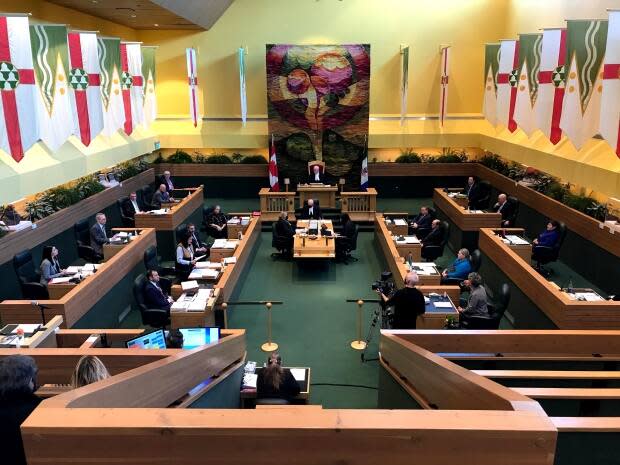Yukon budget projects $12.7M deficit, 'record-breaking' capital spending

The Yukon government is expecting to be in the red this year, with a projected $12.7-million deficit in a $1.79-billion budget that doesn't shy away from capital spending.
This time last year the picture looked very different: the government's budget then boasted a modest surplus of $4.1 million.
However, like most things, that picture was upended by the global pandemic.
By the time fall rolled around, Yukon showed a $31.6-million deficit due to a drop in tax revenues caused by an economic slowdown and an increase in public health spending.
"That is entirely the result of economic and social supports as well as health services for Yukoners in response to the COVID-19 pandemic," said Premier and Finance Minister Sandy Silver.
Capital spending and COVID-19 recovery are priorities
The proposed 2021-22 budget includes a significant increase in spending, with the territory predicting robust capital spending to the tune of $434 million this year. The government says this is a "record-breaking amount" — up 17 per cent from last year — and an attempt to help the economy recover from the pandemic.
The government says some of that capital spending will be offset by federal transfers.
Some capital spending highlights include:
$54.3 million for bridges and highways;
$20.1 million for Yukon's diverse fibre line on the Dempster Highway;
$16.5 million for airports and aerodromes;
The government estimates that operations and maintenance spending will amount to $1.35 billion.
$48.9 million for COVID-19 relief
In 2020-21, the government allocated more than $107.5 million to managing the pandemic. This year, it's allocating less than half that amount — $48.9 million — to COVID-19 relief.
Out of that amount, $15 million has been included as part of a "COVID-19 contingency fund."
The contingencies are set aside for unexpected expenses related to the pandemic, and are not included in departmental budgets. They would need to be presented to the Legislative Assembly for approval in order to be spent. If they aren't needed, the government says, money remaining will be used to cover the deficit.
Other budget highlights include:
$86.8 million for continuing care, home care, palliative care programs and day programs;
$25.2 million for early learning and universal childcare;
$10.5 million for a Whistle Bend elementary school;
$70.2 million for social supports, mental wellness and substance-use programs;
$50 million to address climate change through clean transportation programs, fast-charging stations and electric vehicles, community energy retrofit projects and energy rebates;
and $5.7 million for a secure unit in the Whitehorse General Hospital for people experiencing acute mental health episodes.
"This budget builds on the strong foundation we have developed over the past four years and continues us on the path toward a brighter future for the Yukon," said Silver on Thursday.

The territory's net debt is expected to increase over the next three years due to forecasted deficit spending in response to COVID-19, as well as major infrastructure spending.
The net debt is expected to hit $175.4 million by the end of the year, with a debt-to-GDP ratio of 5.4 per cent.
Optimistic about the future
The territorial government is optimistic about the future, though. Over the next five years, Silver projects, the GDP growth will continue, averaging 4.7 per cent per year out to 2025.
Yukon is one of the only jurisdictions in Canada to experience slight GDP growth in 2020, increasing by 0.1 per cent last year.
Further growth is expected, in part, thanks to increases in tax revenue, increased capital spending, and growth in the mining sector.
Total government revenue is forecast to be $1.37 billion this year, an increase of 5.1 per cent from last year's estimates. Tax revenue is expected to go up 2 per cent.
Decreases are anticipated in personal income tax, and more significantly, in fuel oil tax, while increases are expected in corporate income tax and insurance premium tax.
Federal grants, including the Territorial Formula Financing program, represent more than 80 per cent of Yukon's total revenue this year.
This budget comes as Yukon edges toward a territorial election. Premier Silver has repeatedly declined to offer hints as to when an election might be called, but all three parties are currently nominating candidates.

